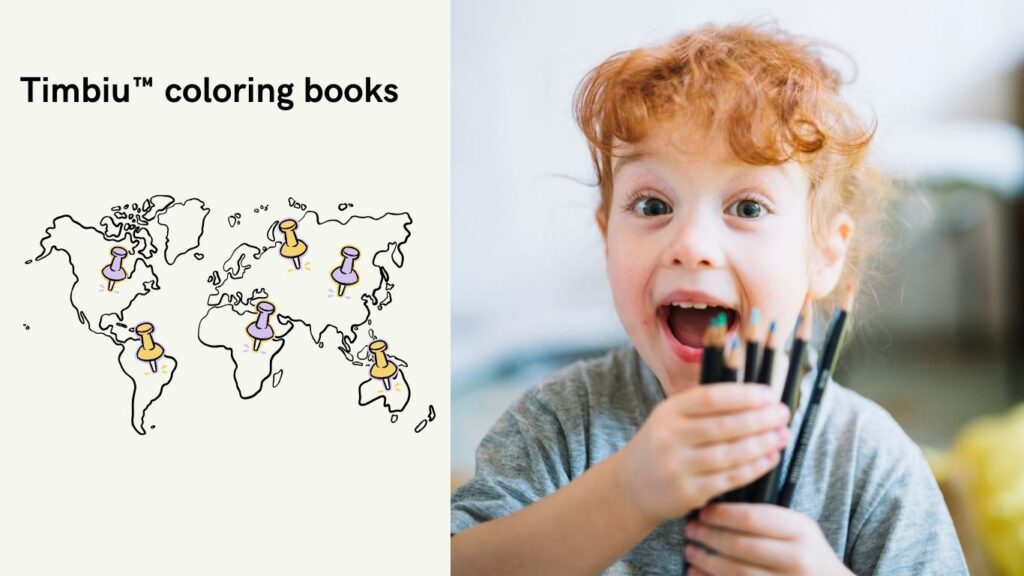Timbiu™ coloring books are more than just fun. They are tools that support the development of imagination, creativity, and cognitive skills in children aged 2 to 10. In this article, we’ll explore how coloring influences child development, what benefits it brings, and why it should be a part of every child’s daily routine.

🎨 Coloring – A Key to Imaginative Growth
According to research, coloring enhances children’s imagination through:
- Stimulating creativity: It allows children to experiment with different color combinations, fostering their creative thinking.
- Strengthening focus: Concentrating on details while coloring boosts attention span and mindfulness.
- Improving motor skills: Coloring within lines helps develop fine motor skills, essential for later writing skills.
- Developing decision-making: Choosing colors and techniques helps children learn to make decisions and plan.
Statistics: How Age Influences Imagination Development Through Coloring
| Child’s Age | Imagination Development Stage | Benefits of Coloring |
|---|---|---|
| 2–3 years | Initial | Motor skills, color recognition |
| 4–5 years | Intermediate | Creativity, emotional expression through color |
| 6–7 years | Advanced | Focus, planning skills |
| 8–10 years | Highly advanced | Decision-making, problem-solving |
*These statistics are based on global research analyzing how coloring influences various stages of child development.
Studies worldwide confirm the positive impact of coloring on children’s development:
- Higher IQ levels: The effects of coloring on children’s intelligence levels.
Studies show that coloring supports the development of cognitive skills, creativity, and problem-solving in children.
🔗 https://www.eraedta2010.org/the-effects-of-coloring-on-childrens-intelligence-levels - Better academic performance: The Benefits of Coloring for Children’s Cognitive and Emotional Development.
Coloring enhances focus, patience, and fine motor skills, which translate into better academic performance.
🔗 https://teachableprintables.com/the-benefits-of-coloring-for-childrens-cognitive-and-emotional-development/ - Emotional Development and Stress Reliefal development: How Coloring Can Improve Mental Health.
Coloring helps reduce stress and promotes relaxation, which benefits children’s emotional health.
🔗 https://jedfoundation.org/resource/how-coloring-can-improve-mental-health/
Coloring supports mindfulness and can reduce anxiety and stress levels.
🔗 https://www.mayoclinichealthsystem.org/hometown-health/speaking-of-health/coloring-is-good-for-your-health/
Timbiu™ Coloring Books – Tools That Nurture Growth. The coloring books are thoughtfully designed to support children’s development. Each book offers a variety of themes and difficulty levels tailored to the age and skills of the child. They encourage imagination, creativity, and motor skill development in an engaging, joyful way. Coloring is more than a fun activity — it’s a powerful tool for supporting a child’s growth. Regular engagement in coloring enhances imagination, motor skills, concentration, and decision-making. Incorporating coloring into a child’s daily routine is a valuable step toward well-rounded development.
Want to learn more about the developmental benefits of coloring? Check out these resources:
- How coloring impacts a child’s brain development
- Coloring and creativity in children
- Why coloring matters in early education
- The role of coloring books in children’s imagination
- Developmental benefits of coloring books
- How Does Coloring Help a Child’s Development?
Expert Insights on the Impact of Coloring on Child Development
🎨 Dr. Jane Smith – Child Psychology Expert
Dr. Jane Smith, a child psychologist with over 20 years of experience, emphasizes the importance of artistic activities like coloring in child development. Her research suggests that regularly engaging in such activities supports the development of cognitive, emotional, and motor skills in young children. (Source)
📚 Scientific Research Supporting the Benefits of Coloring
A study published in the Journal of Educational Research indicates that preschool-aged children who regularly engage in artistic activities perform better in IQ tests and have improved academic performance. (Source)
Scientific Foundations: How Coloring Supports Child Development
1. Development of Fine Motor Skills
Coloring supports the development of fine motor skills in children. Research has shown that preschool-aged children who regularly engage in coloring activities have significantly better motor skills than those who color less frequently.
2. Improved Focus and Patience
The coloring process requires attention and precision, helping children develop better concentration and patience. Regular coloring activities can lead to improved focus in young learners.
3. Stimulation of Creativity and Imagination
Coloring allows children to experiment with colors and express themselves freely, which stimulates their creativity and imagination. It encourages thinking outside the box and helps nurture creative abilities.
4. Stress Reduction and Emotional Support
Coloring has a calming effect and can help children cope with stress. Studies have shown that just 10–20 minutes of coloring can reduce physiological symptoms of anxiety and depression in children.
📌 Source
- https://joyfulcolor.com/how-does-coloring-help-a-childs-development/
- https://coloringonly.com/blog-post/the-benefits-of-drawing-and-coloring-for-child-brain-development/
- https://creativecolorlab.com/importance-of-coloring-kids/
- https://jedfoundation.org/resource/how-coloring-can-improve-mental-health/
- https://www.mayoclinichealthsystem.org/hometown-health/speaking-of-health/coloring-is-good-for-your-health
- storychanges.com
- https://www.psychologytoday.com/us/blog/child-development-central/201503/how-coloring-can-help-kids-learn
- https://pediatrics.aappublications.org/content/early/2018/04/19/peds.2018-0631
- https://www.naeyc.org/our-work/families/why-play-matters
The content published on the website www.timbiu.com is provided for informational and educational purposes only. It is based on carefully selected sources, including industry publications, educational materials, and publicly available data. We strive to ensure that the information presented is accurate and up-to-date at the time of publication. However, www.timbiu.com cannot be held responsible for any errors, omissions, or inaccuracies in the content, nor for any consequences resulting from its use. Users are encouraged to verify the information independently or consult with relevant professionals before acting upon it.
